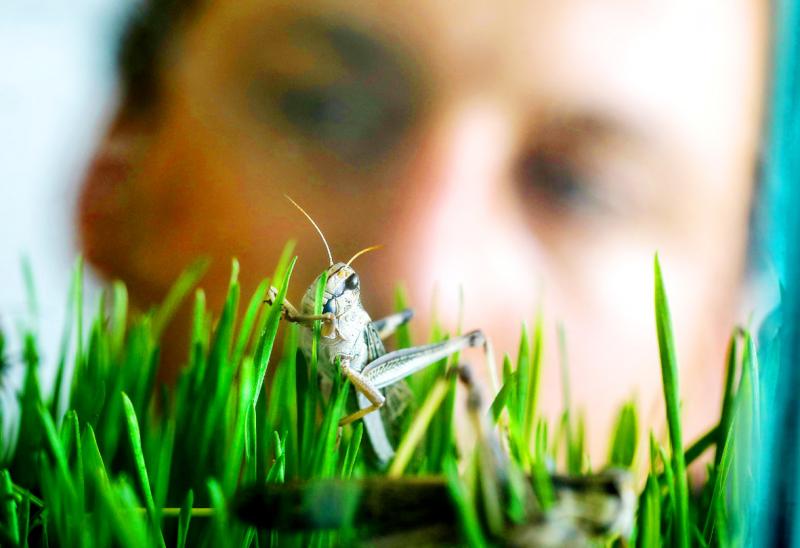From biblical plague to modern day protein, one Israeli firm wants to make locusts a sustainable food choice in the Holy Land and beyond. As for whether or not the insects are kosher, the answer is not so simple.
At Hargol Foodtech’s farm in the Israeli-occupied Golan Heights, a rectangular enclosure that once served as a chicken coop is filled with thousands of locusts, a grasshopper species that has a highly destructive swarming phase.
Contained in a series of meticulously stacked, climate-controlled mesh cages, the insects are served wheatgrass through their three-month life cycle, before being cooled, killed and baked.

Photo: AFP
Hargol chief executive officer Dror Tamir said that he grew up hearing stories of how locusts destroyed the fields of his kibbutz in the 1950s.
Yet the Yemenite Jews in the area did not view locusts as crop-ruining pests, but as an edible source of nutrients, Tamir said.
As an adult, Tamir became a food and nutrition entrepreneur increasingly concerned about the environmental cost of providing the world’s growing population with enough animal protein.
Tamir said that he founded Hargol — Hebrew for grasshopper — six and a half years ago, after realizing that the insects were the solution.
The company’s goal is to be “the first in the world to grow grasshoppers on a commercial scale, and provide the world with a healthier and more sustainable source of protein.”
Ram Reifen, a professor of human nutrition at Hebrew University, said that the planet is facing growing food supply challenges.
With Earth’s population expected to hit 10 billion by 2050, raising livestock to feed the planet would become increasingly unsustainable, given the massive water and land resources required. “The fear is there will be a scarcity of protein,” Reifen said.
Tamir said that unprocessed locusts consist of more than 70 percent protein and contain all amino acids, along with other nutrients.
“What they do lack is saturated fat and cholesterol,” he said. “They have the good stuff. They don’t have the bad stuff.”
According to his own estimate, about 2.5 billion people — mainly in developing nations — consume insects as part of their regular diet.
The “most widely eaten insects in the world are grasshoppers,” Tamir said.
However, “when trying to target North American and European customers, it’s really hard to overcome the ‘yuck’ factor,” he added.
To make Hargol’s product more palatable to Westerners, Hargol turns locusts into powder, which can be mixed into various foods.
Tamir said that the firm is about to launch sales of locust-enhanced pancake mix and smoothie powders worldwide.
Investor support has helped sustain the company before sales tick up, he added.
In the Bible, locusts appear in the Old Testament Book of Exodus as one of the ten plagues unleashed on the Egyptians to force the Pharaoh to free the Israelites from slavery.
In Leviticus, there is a passage stating that certain kinds of grasshopper, including locusts, are kosher.
Jews in Yemen and North Africa have been eating locusts for generations, but European, or Ashkenazi Jews have not.
Tamir said he hopes that he can bring locusts into mainstream Israeli cuisine by getting a kosher certification for his product from the country’s chief rabbinate.
Rabbi Eliezer Simcha Weisz, a member of the Chief Rabbinate Council, Israel’s top religious adjudication body, said that the “phenomenal issue” of whether locusts are kosher has been discussed at “great length.”
While the Torah designates some species as kosher — including the one raised by Tamir — it forbids others, he said.
In the rabbinic literature of Ashkenazi Jews, “for the last 400 to 500 years, it’s specifically stated that we have a tradition to not eat these locusts,” he said.
“That’s why it probably will not be accepted generally by all communities to eat the locusts,” he said, adding that the chief rabbinate has put off a final decision on the question.
Yet Weisz said that despite the complexity of getting approval from the chief rabbinate, a local Golan rabbi could approve the product.
Overall, he said, the return of locusts to Jewish cuisine would be “a wonderful thing.”
Tamir remained optimistic the rabbinate would ultimately give its approval, saying that there is support from prominent rabbis and a planned cooperation with Tnuva, Israel’s largest food producer, to manufacture locust protein powder for athletes by the end of the year.
Meanwhile, Tamir is aiming his products at American and European Christians with grasshopper-enhanced energy bars and jars of roasted grasshoppers alongside Israeli honey.
“According to the New Testament, John the Baptist used to eat locusts with honey,” he said.

MONEY GRAB: People were rushing to collect bills scattered on the ground after the plane transporting money crashed, which an official said hindered rescue efforts A cargo plane carrying money on Friday crashed near Bolivia’s capital, damaging about a dozen vehicles on highway, scattering bills on the ground and leaving at least 15 people dead and others injured, an official said. Bolivian Minister of Defense Marcelo Salinas said the Hercules C-130 plane was transporting newly printed Bolivian currency when it “landed and veered off the runway” at an airport in El Alto, a city adjacent to La Paz, before ending up in a nearby field. Firefighters managed to put out the flames that engulfed the aircraft. Fire chief Pavel Tovar said at least 15 people died, but

LIKE FATHER, LIKE DAUGHTER: By showing Ju-ae’s ability to handle a weapon, the photos ‘suggest she is indeed receiving training as a successor,’ an academic said North Korea on Saturday released a rare image of leader Kim Jong-un’s teenage daughter firing a rifle at a shooting range, adding to speculation that she is being groomed as his successor. Kim’s daughter, Ju-ae, has long been seen as the next in line to rule the secretive, nuclear-armed state, and took part in a string of recent high-profile outings, including last week’s military parade marking the closing stages of North Korea’s key party congress. Pyongyang’s official Korean Central News Agency (KCNA) released a photo of Ju-ae shooting a rifle at an outdoor shooting range, peering through a rifle scope

South Korea would soon no longer be one of the few countries where Google Maps does not work properly, after its security-conscious government reversed a two-decade stance to approve the export of high-precision map data to overseas servers. The approval was made “on the condition that strict security requirements are met,” the South Korean Ministry of Land, Infrastructure and Transport said. Those conditions include blurring military and other sensitive security-related facilities, as well as restricting longitude and latitude coordinates for South Korean territory on products such as Google Maps and Google Earth, it said. The decision is expected to hurt Naver and Kakao

Gaza is rapidly running out of its limited fuel supply and stocks of food staples might become tight, officials said, after Israel blocked the entry of fuel and goods into the war-shattered territory, citing fighting with Iran. The Israeli military closed all Gaza border crossings on Saturday after announcing airstrikes on Iran carried out jointly with the US. Israeli authorities late on Monday night said that they would reopen the Kerem Shalom crossing from Israel to Gaza yesterday, for “gradual entry of humanitarian aid” into the strip, without saying how much. Israeli authorities previously said the crossings could not be operated safely during